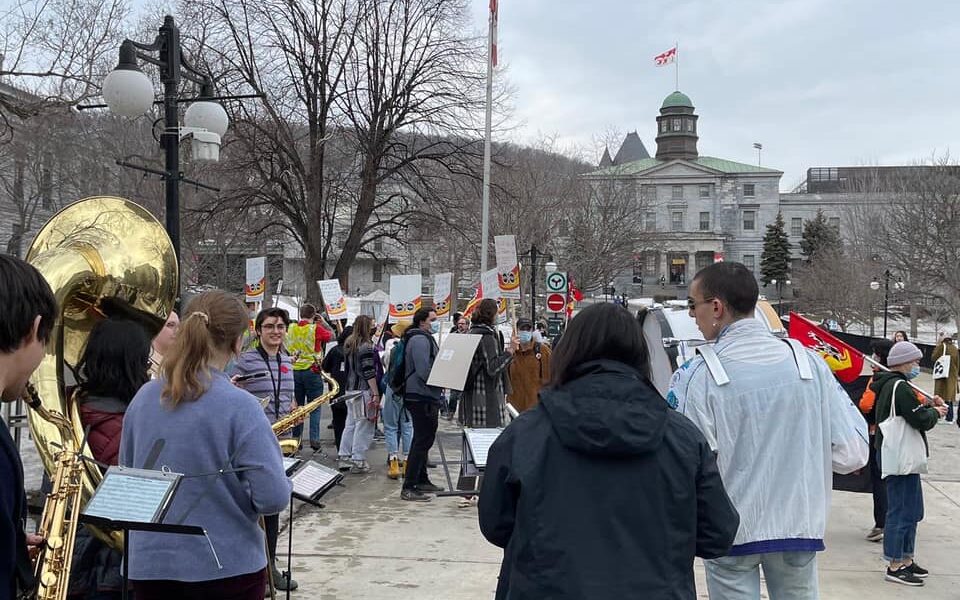On March 17, by way of a town crier, the Association of McGill University Support Employees (AMUSE) announced that floor fellows—upper-year students living and working in residences to provide support to first-year students—will be on strike as of March 18 at noon. The floor fellows’ last Collective Agreement (CA) with McGill expired in July 2020 and is still undergoing negotiations. Though AMUSE chose to go on strike after McGill reduced their wage offer from $13.64 to $13.50, there are other core tenets that they are pushing for, including updating the meal plan amount and implementing retroactive pay. For now, no end to the strike has been announced, with the main goals of the action being getting the McGill Administration to acknowledge AMUSE’s demands, such as $18.00 for the floor fellows’ wage, and ultimately arrive at an agreement on the terms of the new CA.
The strike began with a march from Jeanne Mance park to the Roddick Gates on March 18. AMUSE also hosted a cookout on March 19, where, according to Joanna,* a floor fellow in an upper residence, floor fellows gave out free samosas to students outside of the McLennan Library. Since July 2020, floor fellows and AMUSE have pushed for the inclusion of harm reduction and anti-oppression policies, and have also demanded that their wage and meal plans be adjusted to the rising costs of living in Canada. Floor fellows currently follow the terms of the expired CA, which means that their wages have been stagnant at the 2020 rate for 18 months now.
“De facto, we have been operating on the same collective agreement pending the signing of a new one. One consequence of this is that meal plan rates and wages have been frozen since then,” said James Newman, MA ‘20 and president of AMUSE, in an interview with The McGill Tribune. “If we sign a collective agreement that includes the retro[active] pay we insist upon, wage increases will be paid out to employees in a lump sum retroactive to the last collective agreement.”
Newman told the Tribune that the strike’s primary action was to have floor fellows not enter residences, and perhaps stay in a hotel, from March 18 at noon until March 21—a measure funded by the Public Service Alliance of Canada, AMUSE’s parent union. In doing so, floor fellows did not cross the picket line nor did they perform their regular duties during the strike.
Because floor fellows are bound by an expired CA, they are currently receiving minimum wage for no more than 13 hours a week. According to Newman, floor fellows often work overtime, sometimes up to 30 hours a week, but will still only be paid for 13 hours. Floor fellows are often expected to respond to student crises, build a community within residences, and serve as role models to younger students. It was the lack of compensation for work, according to Newman, that primarily led to the 84 per cent vote in favour of a strike authorization on March 7.
“[The McGill administration] have been quite clear about their disdain for the idea that floor fellows deserve anything beyond the upcoming provincial minimum wage,” Newman said. “What they have thus far failed to communicate clearly is why so many floor fellows have received net-zero pay stubs, when we can expect them to come to us with a fair deal.”
According to Joanna, having an expired CA means that floor fellows face situations that fall beyond the scope of their mandate—like having to mitigate drug use despite receiving no training in harm reduction practices. Hazard pay, too, is a major demand AMUSE is pushing for.
“We really hope that McGill will meet some of our demands,” Joanna said. “We believe what we are asking for is fair. We would like enough meal plan money to cover three meals per day at dining halls [….] We would also like to get hazard pay for 2020-2021 because we were working at the height of COVID.”
In an email to the Tribune, McGill media relations officer Frédérique Mazerolle stated that McGill is working alongside AMUSE and floor fellows in order to find a solution, and that some agreement has already been reached.
“McGill has been in discussion with the union for several months. Both parties have come to [an] agreement on all non-monetary elements within the collective agreement,” Mazerolle wrote. “Further meetings are planned with the union in the coming days. It is our hope we will reach a fruitful agreement rapidly.”
*Joanna’s name has been changed to preserve their anonymity.










Pingback: Cautious optimism for McGill unions as year closes on historic faculty unionization - The McGill Tribune